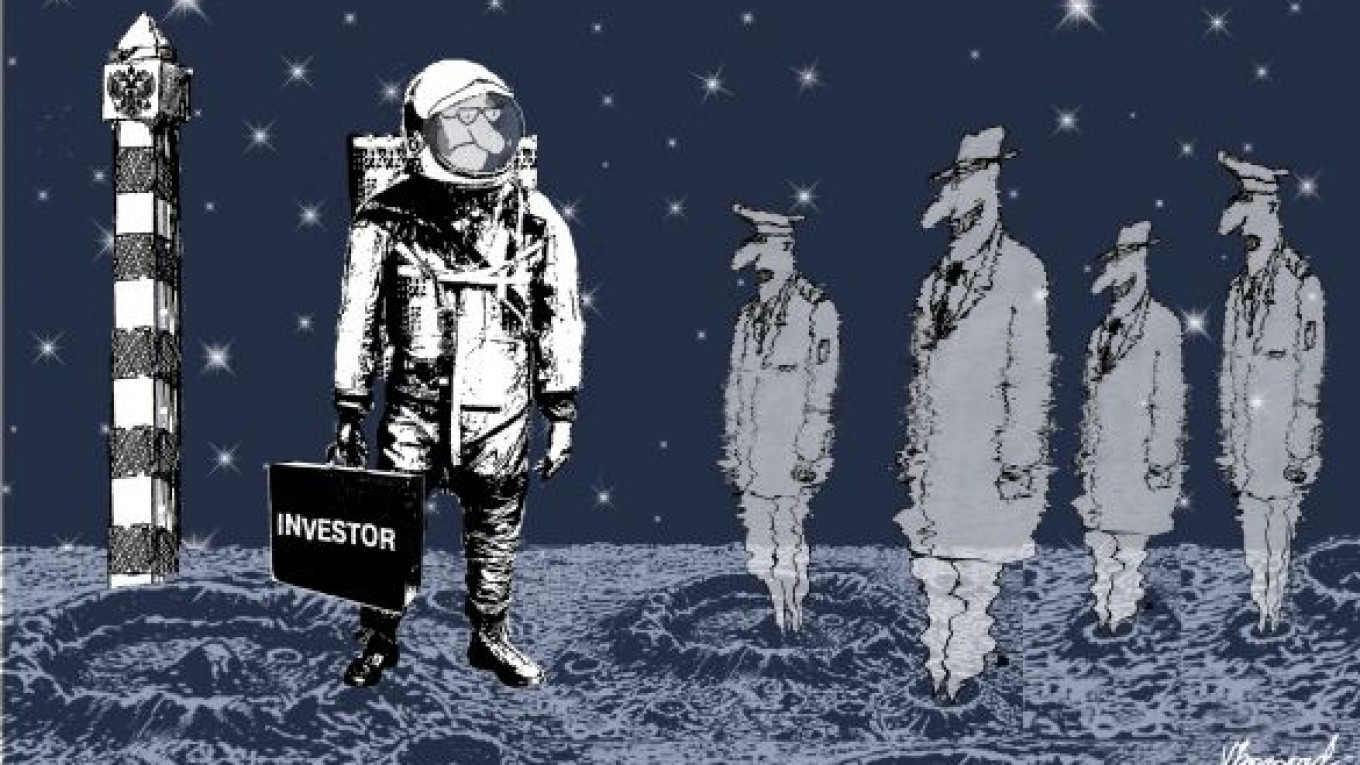Fans of the science fiction movie genre will be very familiar with the phrase and concept of "terraforming." It is a process carried out by adventurers when they modify an inhospitable planet to make it habitable for human life. It is the first step in adapting an alien terrain to make it more familiar for the less adventurous settlers who will follow later.
This is all hypothetical, of course, in terms of emigrating to other planets, but it is a very well-established part of the process for creating a favorable and diverse investment climate in hitherto high risk economies. It is a process that has been underway at a low level in Russia for some time. But several recent high-profile deals show that it is now kicking up a gear or two, and that is a very positive development for indigenous investors regularly frustrated by the widely held external view that Russia will remain an investment backwater.
Let's take a step back for a second and reflect on how Russia is routinely portrayed in the international media. It is often reported as a country always on the edge of political crisis or in need of political change if growth is to be sustained. It is viewed by many commentators as an economy critically dependent on natural resource exports and, by extension, on the growth indicators in other countries such as China. Corruption, red tape and unpredictable courts are also part of the negative mix. Most emerging-market investors know that the stock market is rated cheaply, but, rather than acting as an incentive, the compensating rationale, or antidote, applied is that the market is cheap because the risks are much higher in Russia than is the case elsewhere. Many who read opinion comments about Russia, such as this one, will already have an entrenched view of good or bad Russia even before reading the first sentence.
In the case of being accused of delusion, let's accept that some of the corporate governance practices in the not too distant past have been egregious, and the speed at which the economy and the stock market collapsed in late 2008 is still a very fresh memory for investors. Russia has been something of a roller-coaster ride for investors over the past 15 years. But, as always, it is what happens next that counts.
I have often argued that there is a much better basis today for optimism about the future than has been the case in the past. The crisis of 2008-09 changed attitudes in government and showed how urgent a faster pace of fiscal, business and investment reform has become. The simple and clear fact is that Russia will only achieve the targeted 5.5 percent annual growth rate by accelerating investment into infrastructure and diversification generally and by increasing the efficiency of the economy. To do that, it needs to bring in a much larger number of international investment companies to both co-invest with domestic capital and to bring their experiences and know-how. It also needs to bring in these investors because they are the people who, looking historically at the development of other economies, have been able to apply most pressure on recalcitrant governments and to resist the encroachment of local bad practices. Without them, even the best-intentioned governments are prone to making ambitious five-year plans every year.
Of course, a lot of foreign companies have been active in Russia for many years, and most report strong growth and profitability. Russia is, for example, reported to be one of the most important world markets for companies such as Danone, John Deere, E.ON, Renault and many others. They have all benefitted from the hydrocarbon-fueled explosive growth in Russia's economy over the past 15 years, and Russia is already the biggest market in Europe for many consumer sectors. Little wonder that more than 70 percent of foreign businesses already established in Russia expressed a high level of satisfaction with developments in the economy in a survey published earlier this year by the Foreign Investment Advisory Council.
Attracting investors to bigger projects, such as infrastructure, has been much more difficult. That's why the success achieved with the Russia Direct Investment Fund, or RDIF, is so encouraging. RDIF claims to have attracted more than $9 billion of foreign capital into the country over the past two years, and last week it landed its biggest prize. The government of Abu Dhabi agreed to allocate $5 billion to Russian infrastructure projects. That will encourage others to step in, and it also follows several other substantial commitments from investment funds in Kuwait and Qatar, along with a list of some very successful and long-established, early-stage investors including Blackstone, Warburg Pincus and TPG.
To a large extent, this is the sort of money that an economy at Russia's stage of development needs. The investors are not chasing the momentum themes, such as consumer retailing, but are targeting projects required to create and improve long-term growth. This list includes infrastructure projects to allow the economy to expand into long-neglected industries, such as agriculture and food production. Portfolio investors generally steer clear of these projects because they require a hands-on and often a combative approach to push through the bureaucracy and politics and to ensure original deal terms don't change. That's why it is so encouraging for portfolio investors to see the big-project investors starting to come to Russia in larger numbers.
Reverting back to the movie scripts, not all terraforming projects are successful. Consider the plight of the adventurous in the Alien series. Their encounter with the resident nasties wiped them out. But the history of the real world does show that the people at Blackstone, TPG, Warburg Pincus and from the various Gulf investment funds are made of stronger stuff. They have the experience and the firepower to terraform Russia's economy and investment climate and to make it ready for a much larger pool of less risk-tolerant portfolio investors, particularly from Russia's pensions, insurance and personal-savings sectors. It is only when capital flight reverses and investment from these domestic sources increase to create a greater availability of local capital that Russia will be able to look to long-term sustainable growth without having to always look nervously at such external factors as oil, the actions of the U.S Federal Reserve, China's growth indicators or the latest scare from the eurozone.
Chris Weafer is senior partner with Macro-Advisory.com, a consultancy advising macro hedge funds and foreign companies looking at investment opportunities in Russia.
A Message from The Moscow Times:
Dear readers,
We are facing unprecedented challenges. Russia's Prosecutor General's Office has designated The Moscow Times as an "undesirable" organization, criminalizing our work and putting our staff at risk of prosecution. This follows our earlier unjust labeling as a "foreign agent."
These actions are direct attempts to silence independent journalism in Russia. The authorities claim our work "discredits the decisions of the Russian leadership." We see things differently: we strive to provide accurate, unbiased reporting on Russia.
We, the journalists of The Moscow Times, refuse to be silenced. But to continue our work, we need your help.
Your support, no matter how small, makes a world of difference. If you can, please support us monthly starting from just $2. It's quick to set up, and every contribution makes a significant impact.
By supporting The Moscow Times, you're defending open, independent journalism in the face of repression. Thank you for standing with us.
Remind me later.








